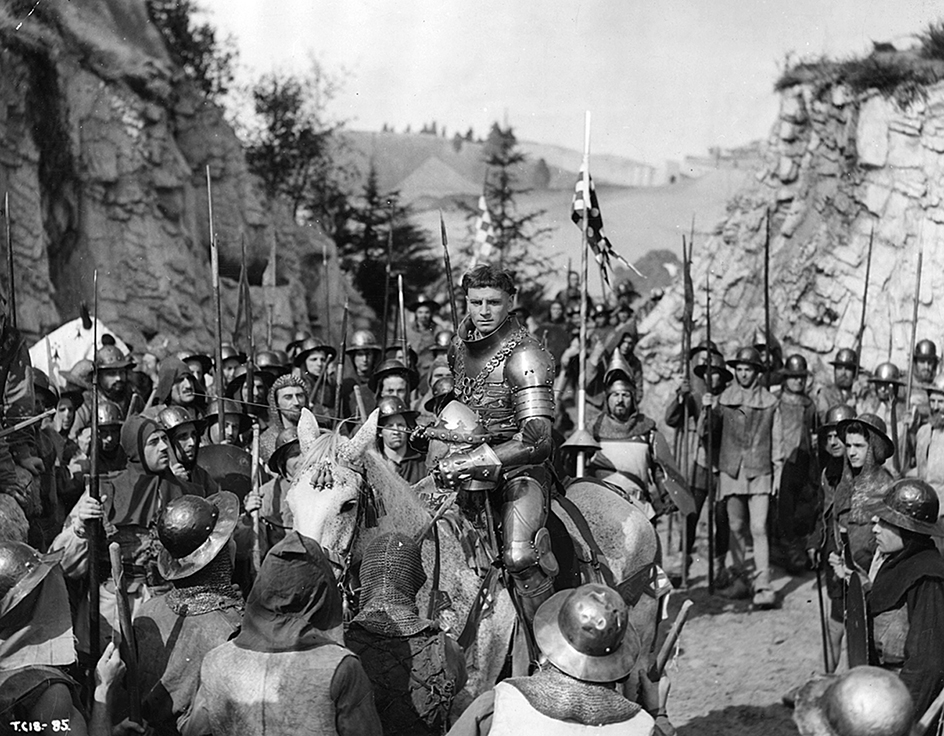Henry V is a five-act historical play by the English dramatist William Shakespeare. Its full title is King Henry V. It was written and performed in 1599, possibly the first Shakespeare play staged at the Globe Theater, owned by Shakespeare and his acting company, in the Southwark borough of London. A passage in the play’s prologue refers to the shape of the Globe: “Or may we cram / Within this wooden O the very casques / That did affright the air at Agincourt?” The play was first published in 1600 in a severely shortened and mangled version.

The play.
Henry V is largely based on the Chronicles of England, Scotland and Ireland by the English historian Raphael Holinshed, on material in Edward Hall’s history The Union of the Two Noble and Illustrious Families of Lancaster and York, and on The Famous Victories of Henry the Fifth (about 1586), a play by an unknown English author. Shakespeare added the brilliant speeches of Henry V on warfare, the comic interludes within the English military camp, and a chorus (a part read by one actor) detailing some of Shakespeare’s most significant comments on how the workings of imagination allow a small stage to reflect a vast historical story. An unusual feature of the play is the large blocks of dialogue spoken in French, a language and a culture often mocked by the lesser comic characters in the play.
The action of the play deals with a condensed version of the first years of the reign of Henry V, an English king who ruled from 1413 to 1422. Shakespeare begins with the young King Henry shortly after his appearance as the fun-loving Prince Hal of Shakespeare’s earlier plays Henry IV, Part I and Henry IV, Part II.
In Henry V, Shakespeare paints an idealized portrait of his central character as a brave, noble, and judicious monarch. The play opens at the English court, where Henry has just been crowned as king. He decides to press a claim he believes he has to the French throne. The French—especially the young Dauphin—refuse to take Henry seriously, based on his earlier reputation for wild living. But Henry as king is much different than Hal as prince. The insulting gift of a set of tennis balls from the Dauphin adds zeal to Henry’s scheme to invade France and establish his claim to the realm.
After unmasking three traitors at the port of Southampton, Henry sails at the head of an army that soon lands in France. Inspired by Henry’s leadership, the outnumbered English troops defeat the French at the town of Harfleur. The two armies then meet in battle near the village of Agincourt. Against overwhelming odds, the English win a great victory. The triumphant Henry is received at the French court. There he is promised the throne and proceeds to woo Katherine, the French princess with whom he has fallen in love.
The play consists of loosely related episodes unified by the character of the king as he deals with counselors, officers, and common members of his army and its camp followers, including the boastful old Pistol and the comic Welshman Fluellen. Some scenes remind audiences that monarchs and their councils plan wars, but ordinary people must fight and die in them. Shakespeare still filled Henry V with patriotic passages, especially the king’s famous address to his troops at Harfleur that begins, “Once more unto the breach, dear friends, once more.” The speech concludes, “The game’s afoot! / Follow your spirit; and upon this charge / Cry ‘God for Harry! England and Saint George!'” In the equally inspiring “Saint Crispin’s Day” speech, he prepares his troops for battle just before Agincourt with these ringing phrases: “We few, we happy few, we band of brothers; / For he today that sheds his blood with me / shall be my brother: be he ne’er so vile, / This day shall gentle his condition: / And gentlemen in England now a-bed / Shall think themselves accursed they were not here / And hold their manhoods cheap while any speaks / That fought with us upon Saint Crispin’s Day.”
Henry claims to hate war in general, recognizing the violence and agony of conflict and also the strain warfare puts on a nation. Yet he finds himself carried away by the glamour and glory of the French campaign.
Stage productions.
Henry V has attracted many great British actors who have starred as the king. They include Charles Kean in the 1800’s and Kenneth Branagh, Richard Burton, Ian Holm, Laurence Olivier, and Ralph Richardson in the 1900’s.
The motion pictures.
The first film version of Henry V starred Laurence Olivier. The Olivier version is often considered the greatest adaptation of a Shakespeare play ever filmed.
Henry V was Olivier’s debut as a film director. It was completed in 1944 and released in the United States in 1946. The motion picture was a great morale-booster to the British people during World War II (1939-1945). The patriotic sentiments of the play made it extremely popular during that period of national crisis. The film won praise for its spectacle and for its vivid expression of Shakespeare’s dialogue. Olivier began the story on the stage of Shakespeare’s Globe Theatre in 1603 and gradually changed it to the actual setting of the action. Henry V received four Academy Award nominations, including best picture and best actor for Olivier. He also received a special Academy Award for outstanding achievement as an actor, producer, and director of the film.
Henry V was also filmed in 1989 with Kenneth Branagh as the star and director. This adaptation was much darker in tone than the Olivier version, emphasizing the brutality of war. Branagh received Academy Award nominations as best director and best actor.
See also Shakespeare, William (Henry V).
